Image created by AI
Crisis in KZN: MK Party Suspends Three Members Amidst Alleged Irregularities
In a significant move that underscores its strict adherence to governance and internal regulations, the uMkhonto weSizwe (MK) Party has announced the immediate suspension of three of its members from the KwaZulu-Natal (KZN) Legislature. This decision, ratified by party leader Jacob Zuma along with the MKP high command, marks a critical point in the party's efforts to uphold integrity within its ranks.
The three suspended members include Thobani Zuma, Dr. Kwazi Mbanjwa, and Sfiso Zuma. Dr. Mbanjwa, who held the influential position of Chief Whip, has been notably stripped of his responsibilities and removed from his post with immediate effect. The nature of the allegations involves supposed "irregularities and transgressions of the party’s constitution," a serious charge that implies potential misconduct at a legislative level.
Nhlamulo Ndhlela, the spokesperson for the MK Party, elaborated on the circumstances leading to these suspensions, citing a zero-tolerance policy towards ill-discipline and unruly conduct. He emphasized the importance of the upcoming disciplinary process, where the suspended members will have the opportunity to present their cases. This hearing, overseen by the National Disciplinary Committee, will ultimately determine the political futures of the implicated members.
This enforcement action by the MK Party not only highlights the challenges of political governance but also sets a precedent in terms of party discipline. As these members face their hearings, the outcomes will likely resonate beyond their individual careers, potentially influencing the procedural norms and cultural expectations within the party and the broader legislative community in KZN.
Furthermore, this development could have broader implications for political stability and the effective functioning of the legislature in KZN. The removal of a key figure such as the Chief Whip disrupts established power dynamics and might affect legislative processes in the near term. Political analysts are closely watching this situation, gauging its impact on both the upcoming legislative sessions and the public’s trust in political entities.
Overall, the MK Party’s decisive action in this instance serves as a reminder of the ongoing challenges faced by political organizations in maintaining discipline and integrity, while simultaneously dealing with the intricacies of legislative governance.










